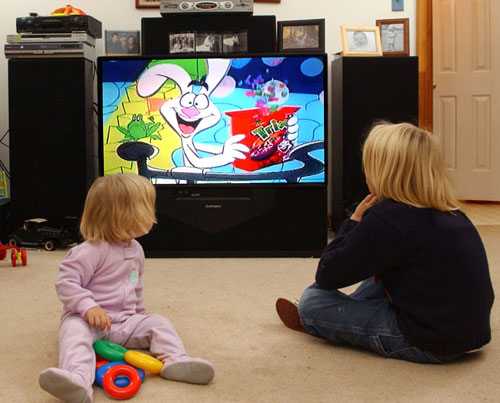How Television is Effecting your Child’s Behavior
Television can be a social activity (the Superbowl, Oscars, Grammys) or a solitary one. For children whose brains are just developing, the ever present question is: is this medium a good one for development? As a healthcare specialist, a speech pathologist is concerned about a lot more than language. In order to provide therapy to the whole child, we must become experts in many aspects of child development- cognitive, motor, behavior, attention, learning- these all influence how our patients progress and participate in speech therapy. It’s no surprise then that parents often ask about what is appropriate or good for their child, “should he play the iPad?” “Is Facebook safe?”- and “How much television is ok?”
According to a new study in the Journal of Pediatrics, better TV might improve your child’s behavior. This suggests that just turning the television off isn’t the only answer but that by changing the channel, children’s behavior can be altered. Thet asked parents to keep diaries and use questionnaires to describe their family’s television habits and their child’s behavior. Half of the parents received advice for six months on getting their 3-to-5-year-old kids to watch programs like “Sesame Street” and “Dora the Explorer” (as opposed to programs like “Power Rangers.)” The results were compared with kids whose parents got advice on healthy eating instead. The researchers found more behavioral improvements, including less aggression towards others, in the group that received advice on television programming. It’s easy to see why this might be important, as those children watched more educational programs that encouraged empathy while the other children watched more aggressive shows. Sadly, the benefits seemed to diminish over time. One of the most at risk groups, low-income boys, seemed to get the most benefit.
What the study seems to advocate most is not so much rules for how much use but what kind of use. This study highlights that all shows are not created equal, especially for children. Consider Spongebob Squarepants for example. While this can be classified as a children’s show, in 2011, the same journal (Pediatrics) published a study that found watching a snippet of a SpongeBob cartoon negatively affected 4-year-olds’ attention spans. Watching a more realistic PBS cartoon did not.
In the study, the 4 year olds were divided into three groups: the first watched Spongebob (on Nickelodeon), the second watched Calliou (a more realistic show on PBS) and the third group colored. Each group was then given tests to measure executive functioning (memory, on task behavior). The PBS and picture-drawing groups performed equally well on the tests; the SpongeBob group scored significantly worse. The authors suggest that watching a full half-hour fast-paced cartoon show could be even more detrimental due to the rapid pace and fantastic characters.
What’s a parent to do?
Parents should heed the advice of the American Academy of Pediatrics who recommend that kids under age 2 not watch any television. For kids older than 2, television should have limitations with rules about screen time. It is OK for parents to tell children which shows are and are not appropriate and encourage limited viewing of Spongebob or Power rangers. It’s ok for them to designate certain channels that are better than others and put the TV on that channel themselves.
While children are developing, it important to remember that children are influenced by their environment, including the language in it and actions they see in others.





This is a great source of information, I am making a thesis for the affect of a child’s behaviour due to television cartoons. I find these information very useful. Thank you.